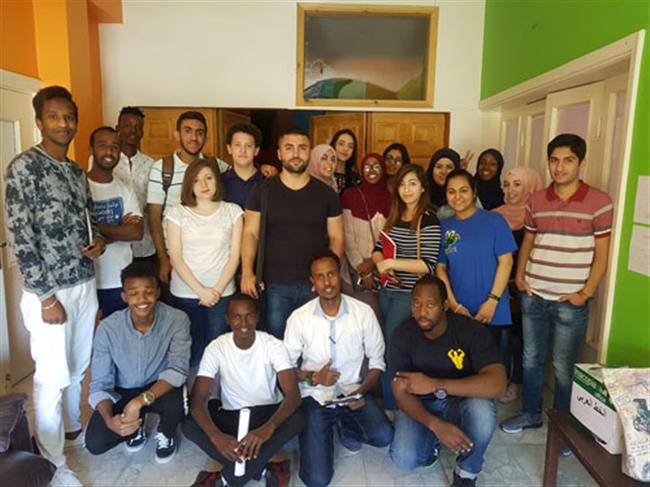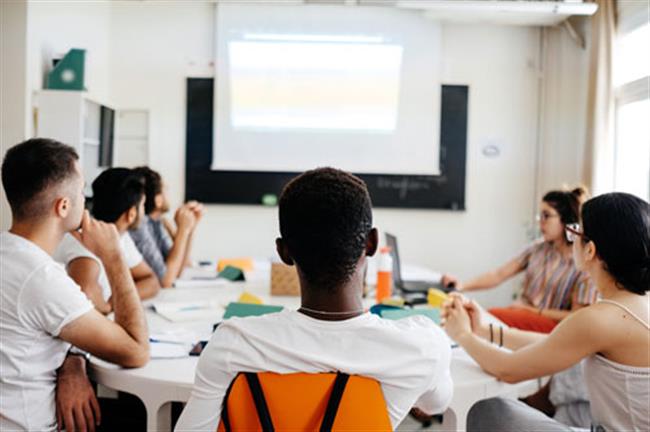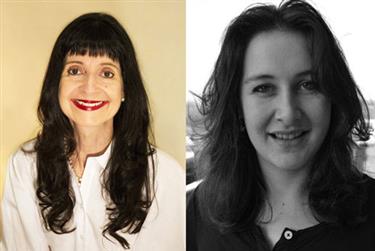The Global Search for Education: The Sky's the Limit for Sky School

"It’s really encouraging to see an increasing number of models that take a learner-centric approach which considers the challenges that young people face today." – Polly Akhurst
Only 23% of the millions of displaced refugees around the world have access to a quality secondary education. How do you address the challenges and the opportunities involved in creating a quality education for refugees?
Polly Akhurst is the Co-Founder and Co-Executive Director of Sky School, a non-profit conceived in 2016 in response to the gap in quality education for displaced youth.
The idea for Sky School was thus born.
Sky School partners with local organizations (such as SOS Children’s Villages) to deliver a blended learning model which supports displaced youth, enabling them to get back into learning. To date, over 100 refugee youth have been educated. All of the courses have been oversubscribed and have a retention rate of over 70%. Sky School is also in the process of developing the first international high school diploma tailored to displaced youth.
The Global Search for Education is pleased to welcome Sky School’s Polly Akhurst.

“We’ve seen that Sky School learning can work across an array of different contexts – whether it’s within camps or in cities in Amman or in Kakuma Camp in Kenya.” – Polly Akhurst
Polly, what kind of education do you believe is important for people who are displaced, and how does your learning model support them?
To develop an important and relevant education we first thought about the purpose of education, and spoke to our target demographic about what they wanted. We then married these ideas with existing global frameworks regarding the education that today’s people need.
In particular, we were inspired by the OECD’s Education 2030 project, which places agency at its center focal point to reach their long term goal regarding both societal and individual wellbeing. We were also introduced to the concept of “lifeworthy learning” through the book Futurewise, by David Perkins. Therefore, we now implement his idea that educational systems should focus on “learning that is likely to matter in the lives [that] learners are likely to lead.” This thinking combined with our research among our target demographic enabled us to develop our own simple and elegant learning model.
We are in the midst of an industrial revolution that is changing our world at dramatic speeds; Design Thinking is becoming more prominent in new curriculums we are seeing around the world. Do you believe we will ultimately see this kind of learning in traditional classrooms everywhere?
It’s really encouraging to see an increasing number of models that take a learner-centric approach which considers the challenges that young people face today. It will take a while for all systems to change, but we will eventually start to see more of a human-centered approach within education. By creating our curriculum, though, we’ve been able to leapfrog ahead of other systems.

“Some people have told us not to 'reinvent the wheel' by developing our own curriculum. However, we’ve found that the wheel has been broken to the point that it requires creating a new one.” – Polly Akhurst
What are you most proud about in your development process for Sky School?
We have just reached a key milestone by developing the first high school diploma program specifically designed for displaced youth. This consisted of convening over 140 educators and displaced youth to develop 1100 hours of curriculum over the course of one year. Through this process, we have also formed a strong relationship with UWC South East Asia, a leading international school which plays a key role in supporting our educational development.
The examples of our alumni have also enabled us to see the lasting benefits of focusing our learning strategy on the development of agency. For example, after taking our course on Social Entrepreneurship, our alumnus, Mofti, has now established his own kiosk allowing him to support himself and his brothers. Another example is our alumna, Zamzam, who took our Peace-building course and is now making a series of YouTube videos to raise awareness of the risks of early marriage. In addition, our alumnus, Moussa, is now setting up the first African fast-food restaurant in Greece to use cooking as a way of uniting different peoples and cultures.
Finally, through piloting courses with a range of partners in four continents, we’ve seen that Sky School learning can work across an array of different contexts – whether it’s within camps or in cities in Amman or in Kakuma Camp in Kenya. We are proud that the context-proof nature of our learning means it can provide world-class learning in low-resource environments to reach a diverse group of young people
As an innovative start up, what kind of challenges have you had to overcome to build your learning model, and what have you learned in the process?
As a young organization, convincing people that we can pull off such an ambitious idea has probably been the greatest challenge. Some people have told us not to “reinvent the wheel” by developing our own curriculum. However, we’ve found that the wheel has been broken to the point that it requires creating a new one. The new wheel, in this case, is a context-proof curriculum tailored to the needs and experiences of displaced youth.
Another obstacle that came was how to develop such a robust curriculum with only minimal resources. Our Director of Education, Stuart MacAlpine, suggested that “what we really [needed was] to gather a group of exceptional individuals in one room for two days.” Therefore, “curriculum hackathons”– which include weekend-long, intensive curriculum-development events — are what best fit our specific learning model.
Initially, we wanted our learning to be completely online thinking as this would make it more accessible. We soon faced another problem, though, as the retention rates for our online courses were much lower than our blended-learning course rates. Our learners told us that what kept them engaged on the blended-learning courses was the personal contact and feeling part of a community.. Overall, remembering that education is a social process and learning that it’s all about people and creating a shared humanity have been key to solving our challenges.

“Engaging learners means being responsive to the needs of both today and tomorrow and enabling young people to create the future they want.”
– Polly Akhurst
What are you working on now for the future? How will you keep Sky School relevant and engaging for learners?
Engaging learners means being responsive to the needs of both today and tomorrow and enabling young people to create the future they want. We continually seek feedback from our learners and partners to incorporate into the next iteration of our courses. We’ve developed the initial courses for our Diploma program, but there is so much more we want to do.
We always work on an assumption of a “temporary fixed position,” meaning it’s our way of thinking at this point, but it can change in the future. This has allowed us to balance the instinctual) need for certainty with our need for provisionality and innovation.
Education is the most powerful, yet expensive weapon for changing the world. However, at Sky School, we’ve shown that this does not have to always be the case, and that those with the fewest resources can still have access to education of the highest quality.

C. M. Rubin and Polly Akhurst
Thank you to our 800 plus global contributors, teachers, entrepreneurs, researchers, business leaders, students and thought leaders from every domain for sharing your perspectives on the future of learning with The Global Search for Education each month.
C. M. Rubin (Cathy) is the Founder of CMRubinWorld, an online publishing company focused on the future of global learning and the co-founder of Planet Classroom. She is the author of three best-selling books and two widely read online series. Rubin received 3 Upton Sinclair Awards for “The Global Search for Education”. The series which advocates for all learners was launched in 2010 and brings together distinguished thought leaders from around the world to explore the key education issues faced by nations.
Follow C. M. Rubin on Twitter: www.twitter.com/@cmrubinworld
















